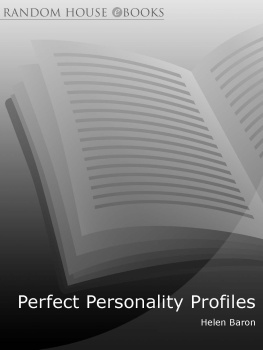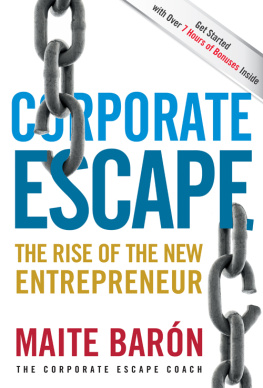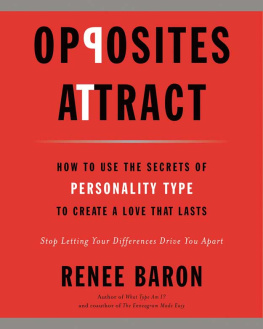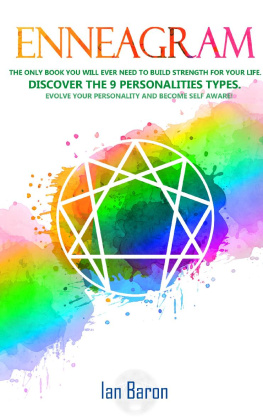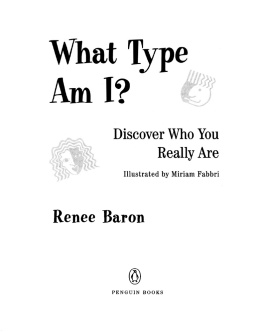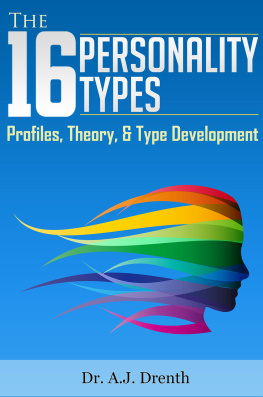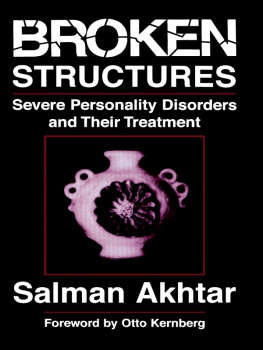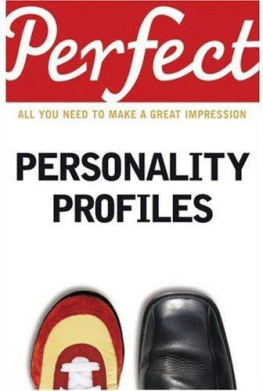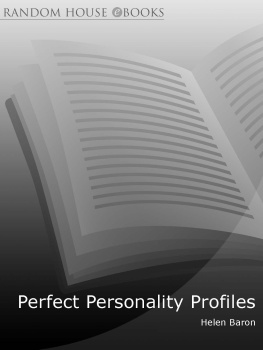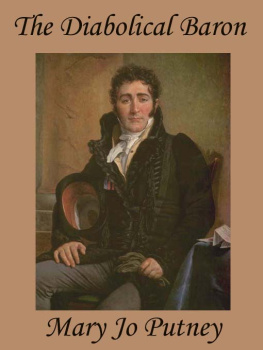About the Author
Helen Baron is a Chartered Psychologist who has spent her career researching and developing psychometric tests. An active member of the British Psychological Society, she was a founder member of its Standing Committee for the Promotion of Equal Opportunities and is currently a member of its Standing Committee on Test Standards. She lives in central London.
Perfect
Personality
Profiles
Helen Baron
This eBook is copyright material and must not be copied, reproduced, transferred, distributed, leased, licensed or publicly performed or used in any way except as specifically permitted in writing by the publishers, as allowed under the terms and conditions under which it was purchased or as strictly permitted by applicable copyright law. Any unauthorised distribution or use of this text may be a direct infringement of the authors and publishers rights and those responsible may be liable in law accordingly.
Version 1.0
Epub ISBN 9781409063315
www.randomhouse.co.uk
Published by Random House Books 2007
2 4 6 8 10 9 7 5 3 1
Copyright Helen Baron 2007
Helen Baron has asserted her right under the Copyright, Designs and Patents Act 1988 to be identified as the author of this work
This book is sold subject to the condition that it shall not, by way of trade or otherwise, be lent, resold, hired out, or otherwise circulated without the publishers prior consent in any form of binding or cover other than that in which it is published and without a similar condition, including this condition, being imposed on the subsequent purchaser
First published in the United Kingdom in 2007 by Random House Books
Random House Books
Random House, 20 Vauxhall Bridge Road,
London SW1V 2SA
www.randomhouse.co.uk
Addresses for companies within The Random House Group Limited can be found at: www.randomhouse.co.uk/offices.htm
The Random House Group Limited Reg. No. 954009
A CIP catalogue record for this book is available from the British Library
ISBN 9781905211821
The Random House Group Limited makes every effort to ensure that the papers used in its books are made from trees that have been legally sourced from well-managed and credibly certified forests. Our paper procurement policy can be found at: www.randomhouse.co.uk/paper.htm
Typeset by Palimpsest Book Production Limited, Grangemouth, Stirlingshire
Printed and bound in Great Britain by CPI Bookmarque, Croydon CR0 4YY
Contents
Table of Contents
Introduction
You may be looking at this book because you think you, or someone you know, might have to complete a personality questionnaire in the near future, or perhaps you have filled one in recently. The purpose of this book is to help you understand more about personality questionnaires and the profiles they produce. As with much of what psychologists do, there are some myths and misunderstandings about questionnaires. Some people think they have some magic power to unearth deep secrets about them, while others believe they are all nonsense and are no more valid than horoscopes or tarot cards.
The reality is that psychologists apply scientific methods to thinking about human behaviour. They develop personality questionnaires and profiles as tools to provide descriptions of how individuals behave, and they aim to do this in the most straightforward way that is effective. For the most part there is no magic about the way personality questionnaires work. They ask a series of often very simple questions about how you think, feel and behave and then collate the answers in a standardized way. At their most basic, questionnaires ask you whether you like being with people and then feed back as a result whatever you said.
If questionnaires are so simple why do employers use them so much? Test publishing is a multi-million pound industry in Britain, and as someone who works in the field of test development I am constantly being contacted by new clients who would like me to help them develop another questionnaire. The reason people want psychologists to develop tests and questionnaires for them is that there is a lot of evidence that such measures are more efficient, effective and accurate than most other methods of assessing people. Psychologists have researched the most important factors in understanding people and encapsulated these into questionnaires. This is good for the employers, who can quickly gain a clear and objective picture of an individual. Personality profiles provide accurate, easily comparable information about each applicant for a job.
Questionnaires also benefit candidates and others being tested. The process of being tested is relatively quick and painless. Some questionnaires take up to an hour to complete, but they usually take much less time. More importantly, they produce objective and accurate information that is not subject to the individual biases of an interviewer. Your results wont be different if you have ginger hair or speak with an accent.
In this book I describe what personality is and how it is measured. There is a section on some commonly measured personality traits and characteristics, and this includes some concepts that are related to personality and that you might encounter in questionnaire-based assessments such as competencies and emotional intelligence. You can use this chapter to think about yourself and understand more about your own personality.
This book does not contain a full questionnaire for you to complete. It is not possible to do this effectively because of the variety of needs and backgrounds that readers may have. A full questionnaire is likely to be misleading for at least some people. There is, however, a section with lots of examples of different types of questions so that you can see what questionnaires are like if you have never completed one before and would like to practise answering questions. There is also a section describing how employers might use your questionnaire results.
The chapter on preparation is more about how you dont really need to do much preparation to complete a questionnaire. After all, you are probably quite an expert on the subject of yourself, and what you are being asked to do is describe yourself. However, there are some hints and tips about answering questions and getting the best out of the experience.
At the end of the book are sections on standards in using questionnaires and answers to some frequently asked questions.
I hope the book will help you understand more about personality questionnaires and what they do and, if you are anxious about completing one, that it will allay your fears. Undergoing assessment for any reason, whether you are applying for a job or being assessed to help your development, can be unnerving. The best of us can worry that we wont come up to scratch or will be found wanting.
Although the book is called Perfect Personality Profiles there are no good or bad personalities. It isnt better to be extrovert than introvert or flexible than structured. These are just different ways of being. Of course, some personalities are better suited than others to some roles: sales people need to be outgoing and friendly rather than shy and retiring; administrators can be introvert, but they do need to be structured in their approach; journalists need to be flexible and confident. A person who is suited to one role might be hopeless in another. Understanding people and matching them to roles is where personality questionnaires and profiles can be so useful.
Other titles in the Perfect series


